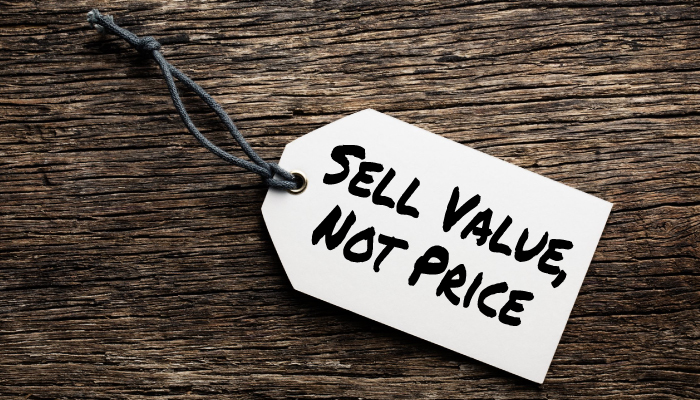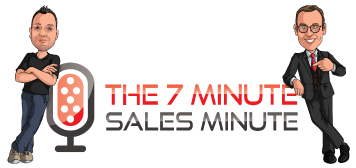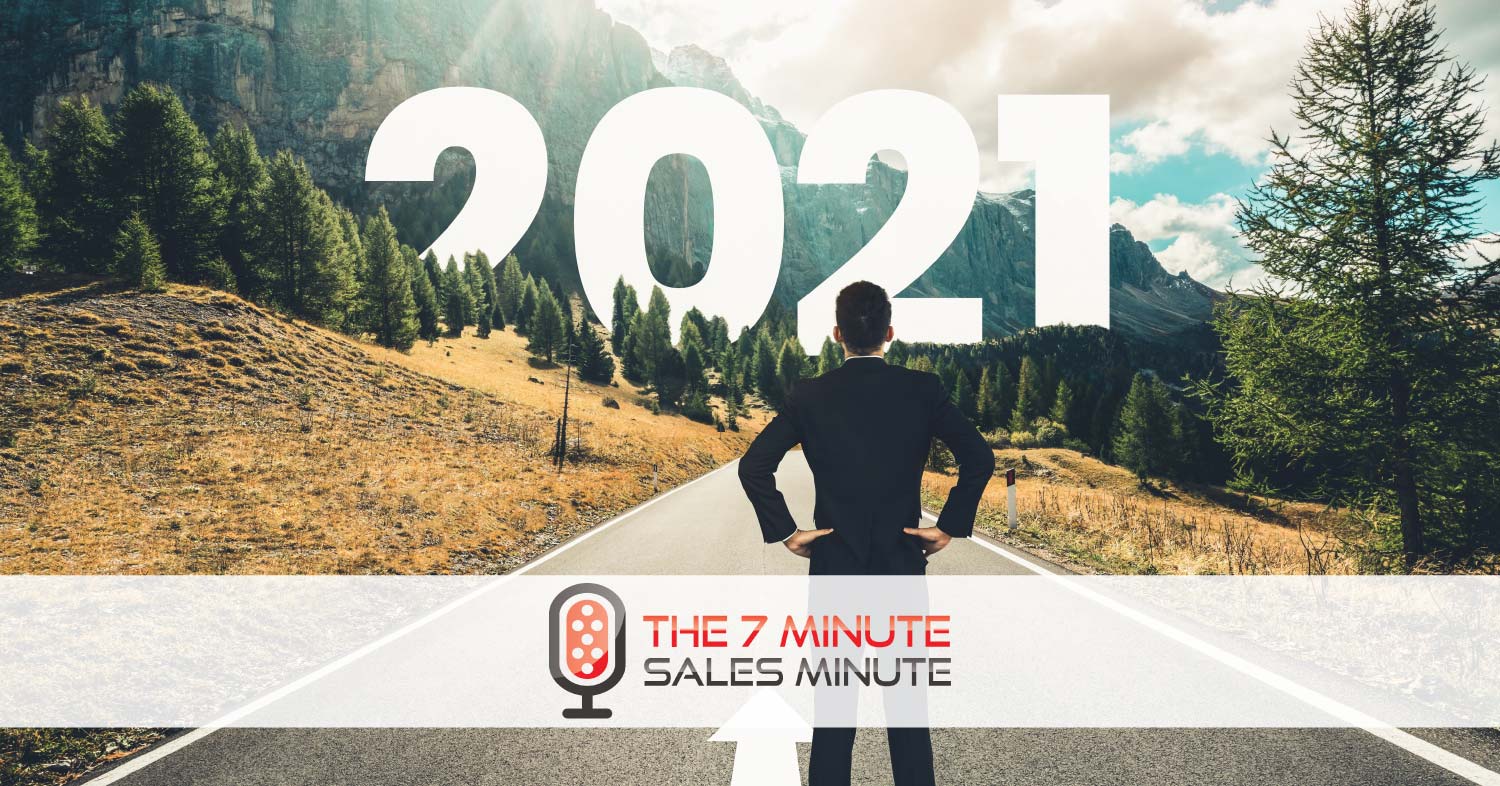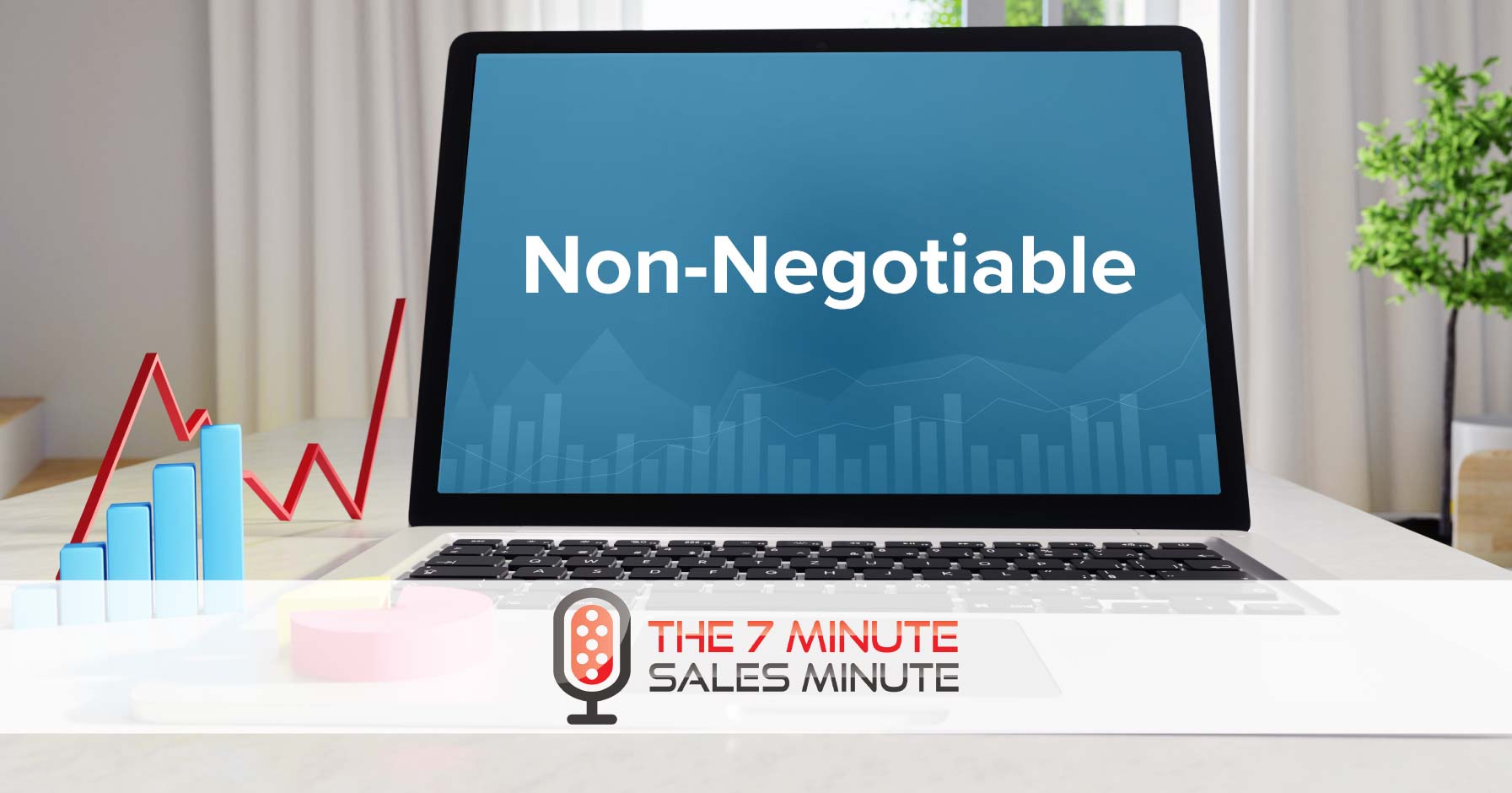
In this episode, the fellas discuss common mistakes made by salespeople and what we can do to avoid them.
Read the full transcript
Scott Fishman: I’m Scott Fishman.
Jon Dwoskin: I’m Jon Dwoskin.
Scott Fishman: And this is The Seven Minute Sales Minute.
Jon Dwoskin: Welcome, everybody.
Scott Fishman: Jonathan, how ya’ doing?
Jon Dwoskin: Fish, what’s going on? How are you?
Scott Fishman: I’m doing great, man. An amazing, productive day.
Jon Dwoskin: Oh, good. What’s made it so productive?
Scott Fishman: You know what? I don’t know. I just feel like I got a ton done. I woke up and I actually did a lot of administrative stuff, a lot of pipeline work for the week, when it was quiet, and I didn’t have to worry about my phone ringing, or any client questions coming in. I was able to actually get a lot done.
Jon Dwoskin: Just hearing you say that reminds me of a time years ago. I took Strategic Coach for a year. Once a quarter, you go to Chicago. I went to Toronto one quarter, and one of the things they talk about is you should have focus days, free days, and buffer days. Focus days are when 80% of your day is when you’re with your client. Free days, are when you don’t touch work for 24 hours, and buffer days are when all you do is specifically clean up, because you can catch up and you can get ahead, and just be incredibly productive.
In strategic coach terms, you had a buffer day.
Scott Fishman: I am all about that buffer day, for sure. I really am. I do it all the time. Every weekend, even if I’m not trying to get new business, I’m actually nurturing and watering a plant, so to speak.
Jon Dwoskin: Yeah, yeah. I would say, I had the same type of day, too, and it’s important. I know we have our topic for today, but I don’t know how business people or salespeople, or whatever profession you’re in, if you don’t have those buffer days where you’re just doing clean-up work to catch ahead and get ahead, I feel like you’re probably always going to fall behind.
Scott Fishman: We’ve talked about that before. I think that’s like when you get in on Monday morning and the treadmill is already turned up to seven and you’re just hopping on, and you’re at a full sprint, and you never catch your breath. You never catch up. You’re right.
Jon Dwoskin: So, we got to take some time as salespeople. Which moves into our topic for the day.
Scott Fishman: Yeah.
Jon Dwoskin: Want to tell everybody what that is?
Scott Fishman: Yeah. We’re going to talk about seven common mistakes that salespeople make – whether it be rookies or veterans.
Jon Dwoskin: There’s only seven?
Scott Fishman: Seven today. This is a Seven Minute Sales Minute, Jon.
Jon Dwoskin: Oh, right. Right. Alright, good. I think we got some solid stuff to talk about with people, and whether it’s a reminder to put back on the top of your list. These are things that you want to be very conscious that you don’t do.
Scott Fishman: Right.
Jon Dwoskin: Figure out the positive way to do it. Where should we start?
Scott Fishman: I think the first one should be the biggest mistake that I see people make: it is making it all about the price.
Jon Dwoskin: Yeah, I would agree. I think it’s all about value. Not about price.
Scott Fishman: Exactly. Price is what you pay. Value is what you get. Right?
Jon Dwoskin: I think sometimes people, salespeople specifically, they feel like they get a live one and then they rush and tell the price, as soon as somebody asks what the price is, because they think they have to answer that question.
Scott Fishman: Well, how much is it?
Jon Dwoskin: Exactly, and then you worry about cutting a deal, and then if you live by the sword or you die by the sword. So, if your customer is asking for a deal, and you’re going to say, “Hey, let me talk to my manager at the back and see how far we can go.” If you do that, they’re never going to stop asking.
Scott Fishman: Right.
Jon Dwoskin: So, when you sell by price, you’re definitely killing revenue.
Scott Fishman: Absolutely, and I think if we were just trying to play it out. When somebody asks, “Hey, what’s the price?” If they ask too early in the process, before you’re done talking about their value or asking questions to understand what’s going on with them. They’re painting their situation. You can table, we’ll get to the price after I understand exactly what you need. You’ve got to build the value.
So, I would say the lesson is, don’t feel pressured to give the price until you have everything you need to give a price.
Jon Dwoskin: Yeah. I don’t see any problem with that. Jon, I think that’s a great question that you ask about the price, but at this point, I don’t know for sure that we’re even a good fit for each other. Let’s have a little bit of a dialogue here and find out if we even have the product that you need.
Scott Fishman: Right, and once you’re done with all those questions, and you have the information, it’s okay to say, “Hey listen, let me kind of process what we’ve talked about, put it into a proposal, and then in the proposal we’ll also address the investment.” By the way, I think the word investment, instead of pricing, is much better, because if it’s really valued as something they need, it should be as an investment, and if you start articulating it that way then people get off of the price, and they know it’s an investment in themselves.
Scott Fishman: Yeah, and it’s easy to figure out the return on their investment as well.
Jon Dwoskin: Correct. So, those I think, serve some high level things that we kind of zoomed out. Anything else, as far as price?
Scott Fishman: Jon, I think we actually hit it. You know, this is a big thing. We have seven things to talk about on the Seven Minute Sales Minute, so we’re going to hit number two. What’s next?
Jon Dwoskin: Alright. Not connecting with the prospects. Let’s talk about that one. What are we doing wrong if we’re not connecting with the prospect.
Scott Fishman: Well, if we’re not connecting with the prospect, we’re not creating any sort of relationship with them. It’s all clinical, and at that point, number one, it does all become about price, but we’re not actually giving them the value. There’s no warm fuzzies. We don’t know enough about them. They don’t know enough about us, our product, our company. We need to really connect with them, in order to find out how we can tailor a solution to their needs.
Jon Dwoskin: Right, and I would say that not being robotic and knowing something about the prospect too, before you even call them. Now there’s different types of businesses. There’s businesses where people are calling in, and maybe you don’t know everything about them, if that’s your business, but if you’re making calls or going to see people outbound, and you have the ability to do research, then absolutely you should be doing research. If not, everybody in my opinion, should have kind of a cheat sheet, a prospect cheat sheet of some initial questions that you’re going to ask that person. I like to call them the hang up questions. If somebody calls you on the phone, or you get somebody on the phone, the questions that you ask get them thinking so they want to talk to you. So, you’re constantly trying to connect with them, but really just having the cheat sheet of questions and knowing what you’re going to do and how you’re going to run that meeting, because you need the reminder I think.
Scott Fishman: Right, and if you’re not connecting, if there is no connection with the client, and you ask them a question, whether it be a B to B sale, a B to C sale. Any sort of sales, if you’re actually not connected with them and you ask a question, sometimes you’ll actually get the Why do you need to know that answer, and there’s nothing more uncomfortable than that. That’s just such a stopper.
Jon Dwoskin: That’s the worst. You know what else I think, Fish, is that salespeople sometimes, are not listening so the transitional questions don’t make sense. So, they ask a question. The client answers it, and then the next question should be something that layers on top of it, but they might as well have asked what their favorite Chinese food dish is, because there’s no connection, and they completely lose the prospect at that time.
Scott Fishman: Right. Relevance is gone at that point, for sure.
Jon Dwoskin: Right. Okay, so what’s next?
Scott Fishman: Next is stop accepting maybes.
Jon Dwoskin: Oh, I hate maybes.
Scott Fishman: We want a yes or a no.
Jon Dwoskin: Maybe make any salesperson, or anybody, feel like you just know you did something wrong, but you may not know it exactly, and then you just kind of try to run up hill. The connection a lot of times is lost if somebody says maybe.
Scott Fishman: Yeah, you’re floating. I would much rather hear a no, like get a door slammed in my face, than a, “yeah, follow up with me”. Send me your numbers.
Jon Dwoskin: Right. Maybes kind of make me think, at least me back in my day when I was pounding the phones, and doing what I wanted to do, maybe it’s always made me feel like a loser. I don’t know any other way to say it. You think you’re doing stuff, and you’re going in the right direction, and then somebody says maybe, and it’s just like, it shatters you. I would say one of the things that I continue to learn from maybes is prepare, prepare, prepare. We talked about that a lot, but really make sure that you are preparing for whatever it is, and having the cheat sheets, or role playing internally, and going over things before meetings, so at least you can look back and say, “It may have been a maybe, but I know I kind of did the best I can. Now what’s the do-over and how can I grow from it?”
Scott Fishman: Right. The fact that you got frustrated from a maybe, actually says a lot about you and your mindset. What I see, and one of the reasons I think sales people need to avoid maybes like the plague, is that a lot of newer salespeople or maybe salespeople who are in a slump, they actually embrace that maybe, because it’s comfortable.
Jon Dwoskin: Yeah, that’s true.
Scott Fishman: The client doesn’t say yes, but you know what? They didn’t say no, so I’m just going to take that maybe, and I live to fight another day.
Jon Dwoskin: Right. I’ll fill my pipeline with a bunch of maybes so I feel good is what you’re saying.
Scott Fishman: Exactly.
Jon Dwoskin: Yeah, yeah. Get rid of the maybes.
Scott Fishman: Exactly. I’m just going to call people all day, just to check in.
Jon Dwoskin: And see if the maybe is still a maybe. One of the things I recommend to salespeople is when you take your pipeline, and you have all the different tranches of your pipeline, really from the minute you talk to somebody, rate the probability of that person and if you think you’re going to do a deal with them. Then keep on rating the probability. So, if you close a deal, and it’s always so interesting because sometimes people will rate a prospect as a nine, but the four adds up to the finish line. So, it’s really good to build your muscle, to reel in your pipeline with that type of stuff.
Scott Fishman: Yeah, definitely.
Jon Dwoskin: Okay, good. Next. Being afraid or reluctant to close. That is a killer. That’s a killer.
Scott Fishman: You kind of have to close. I think that actually goes hand-in-hand with the previous one of accepting the maybes. Sometimes we stay in our comfort zone, whether we’re afraid to close, because we don’t want to hear no. Whether we’re reluctant because we just don’t want to be that pushy salesperson. We want to make sure that we’re actually moving forward with the sale in some way, shape, or form. We’re moving towards the M game of making the sale.
Jon Dwoskin: Right. Ask, ask, ask, and you’ve got to find out different ways to ask for the close. If the client wants you, I think the client wants you to close. They want you to be that leader. They want you to have the courage to close them, because they, a lot of times, need you to lead them to something. If you’re too afraid and reluctant to close, you should really get out of sales.
Scott Fishman: Yeah.
Jon Dwoskin: I mean, you should. At least people facing sales. Maybe there’s ability back end, where you can deliver a great product, and work with a salesperson and interface with clients when the sales person brings you in, and you can talk deliverables, and be a great backend person who can put together great packages, or this, that, and the other. If you don’t see yourself growing into being able to close, and be more courageous and get out of the fear, then you should rethink your career.
Scott Fishman: Absolutely.
Jon Dwoskin: As a direct sales person.
Scott Fishman: I like that. And think about this. If you’re afraid to close because you feel like you’re being pushy, you just haven’t done your job yet, because like you said, a client wants to be led to water. They want to know what the next steps are, but if we haven’t gotten them to want that, then we haven’t done our job.
Jon Dwoskin: Right.
Scott Fishman: The sale hasn’t been made yet, so we have to go back and figure out why.
Jon Dwoskin: Right. You can lead a horse to water, but you can’t make it drink.
Scott Fishman: Exactly. You can lead them to water, but you can’t make them close.
Jon Dwoskin: Right. That’s in my head, what I meant to say. Alright, what’s next?
Scott Fishman: Well, this one actually, again, is segue-ing directly from the last one, closing too often. Exactly. We’re sitting here, and it’s like someone just pecking you on the forehead, like hello, hello, hello. It’s really annoying, but also a lot of salespeople, they think, if I keep closing, if I keep telling Jon how much I want his business, it’s really going to make it look like I really want his business. In reality, what it means is I really need your business. You know, I’m a little desperate.
There’s a guy we know. I don’t know if you’re going to remember this. We saw him at the gym when we worked out, and he is the epitome of prospecting because he would hit on every girl at the bar, every time he was at the bar, because he figured it was a numbers game.
Jon Dwoskin: Right.
Scott Fishman: I don’t think he seemed like he really wanted the business. I think he seemed like he needed the business in that respect.
Jon Dwoskin: Right. If you’re closing too often, and this goes back to what we said in the beginning, if you’re not providing value then they think you’re kind of not trying. So, it all kind of goes hand in hand. It’s one thing to say to somebody, “Hey, let me repaint a picture of why this would benefit you, and this, that, and the other.” But when I hear that, and talk about closing too often, it’s just what you’re saying. It’s out of desperateness. So, if you feel like you’re desperate, you really have to step back, and you have to understand again, prepare, and practice. You have to have five, 10, 15, 20 ways to be able to close somebody, and if you know, if you have the value, you can keep on closing. Everything is almost a close. If you haven’t built up to it, then you’re going to lose the sale.
Scott Fishman: Exactly. You have to step back and earn it. Alright, what’s next on the list, Jon?
Jon Dwoskin: This one drives me crazy, but I completely understand why it is such a common mistake, that sales people don’t/forget to ask for a referral/introductions. It’s such an uncomfortable ask. It makes people feel desperate. It’s very difficult for salespeople to open and ask for that window, to ask for an introduction. You know, Mr. Client, Miss Client, I’m growing my business. Do you have anybody that I can service, the way I’ve been working with you? If you can share my name and number, I’d love it. But people have a really difficult time asking for that.
Scott Fishman: Yeah, and there’s a reason, because a lot of times we’re asking for referrals before we’ve actually earned their business. So, we’re asking our prospects to send us more prospects.
Jon Dwoskin: Right.
Scott Fishman: We haven’t done the job for them yet, so we’re like in our hands, we haven’t actually earned the right, but at that time, they’re actually still liking us. We’re still having conversations. We haven’t gotten the no from them yet, so it is definitely, I think, it’s the prime time to ask for an introduction.
One time I always love to ask for an intro is when I’m actually being told no. I love to say, “Well, who else do you know?” Because that one is amazing. You’ll get referrals from that, I promise you. The other one is when you have to tell someone no, like in my business when someone doesn’t qualify for my product, I always ask for referrals, because those people are happy. I actually told them why they didn’t qualify and what we need to do, and when they can come back to me, if they can come back to me. They’re happy that I actually treated them like a human being. You’d be amazed at how many times I get a phone call an hour later. Here’s my granddaughter’s phone number, or here’s my neighbor, or my barber, or someone. I get the referrals that way. It’s amazing.
Jon Dwoskin: Right. We ran a really good topic of just delivering bad news to clients, and that can be really tough, but if you do it the right way, you can grow your business better.
Scott Fishman: Jon, I love the fact that you said that, because that leads us right into our next topic here.
Jon Dwoskin: What is our next?
Scott Fishman: Hiding the negatives, or hiding the red flags. I think that if you have to deliver bad news, and you have to actually give someone a shot of reality, it’s better to do it upfront. We don’t want to hide things. We don’t want to bury things into a contract. We don’t want to purposely minimize a cost, that we know is going to change in the future. We don’t want to be known as a bait and switch artist, but I think newer sales people especially, they get that comfortability with explaining to people, the cost or the price of a product, or any sort of negative. Like, if it’s from selling cars, and it’s 20 miles per gallon city, and 30 on the highway. I don’t want to say it’s 30 miles per gallon. I want to give them the actual 20 – 30 numbers. I don’t want to just make it sound like it’s this amazing thing, because when it doesn’t occur, then I’m going to have to answer to that later.
Jon Dwoskin: Right. When you talk about that, just be yourself. Be upfront. Tell people everything, so there’s no discovery in any element. It’s going to come out, and it’s going to end up destroying the deal in the 11th hour, so don’t bulls*** them, and don’t bulls*** yourself.
Scott Fishman: Right, and if you foreshadow things upfront, it’s amazing, they know about it. When something comes up later they’re like, “Oh yeah, Jon told me this was going to be on there. I knew about it. No big deal.” And if you make yourself available, and say, “Hey, you can call me anytime if there’s any questions on anything.” It’s amazing how many times that I should pick up the phone, and you can harken back to it. I actually mentioned this on our very first conversation, that this was going to happen. It’s standard. It’s no big deal, versus you aren’t there. They go to bed, and they say, just like marriage, you don’t go to bed angry. They go to bed, and the next day they’re calling you fuming mad about whatever it is. There’s definitely a negative there.
Jon Dwoskin: I would suggest that a lot of times when you have to tell them tough stuff, that you document it and maybe even follow-up with an email, because how they hear it, and how you tell them, depending on what it is, but the more you document, the less it will bite you in the a** moving forward. Because people forget. They do.
Scott Fishman: I like that. Don’t get you’re a** bit.
Jon Dwoskin: Exactly. Alright, those are some good common mistakes, and some solutions of how to get over it.
Scott Fishman: I like it, Jon.
Jon Dwoskin: Yeah.
Scott Fishman: I literally at this point, I want to say thank you to all of our listeners.
Jon Dwoskin: I agree.
Scott Fishman: This was a fun episode. I enjoyed putting this together with you.
Jon Dwoskin: Yeah, me too.
Scott Fishman: I’m excited for next week’s show, and again, thank you everybody for listening. Buy our books.
Jon Dwoskin: Oh, yeah. Buy our books. Yeah. You’ll learn a ton of stuff. Scott’s books are incredible sales books that I think everybody should be reading.
Scott Fishman: So are Jon’s.
Jon Dwoskin: Oh, I was hoping that you’d say that.
Scott Fishman: Thank you very much, everybody.
Jon Dwoskin: Thanks everybody. Have a great one.




